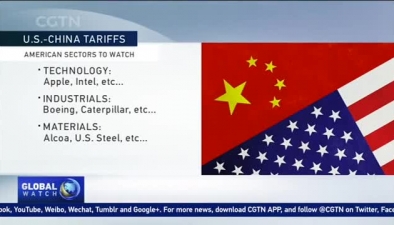NEW YORK, April 5 (Xinhua) -- The U.S. Section 301 investigation of China's intellectual property rights practices is "preconceived" as the United States "never did have a durable case to make in the first place" that China was in violation of its treaty-based commitments, said a U.S. expert.
With regard to the Section 301 investigation of its IPR practices, China has been accused of "all sorts of economic crimes," including "aggression, long-standing theft, coercive practices, etc.," said Sourabh Gupta, senior fellow at the Institute for China-America Studies in Washington, D.C., in an interview with Xinhua, "These accusations have been repeated so frequently over the past half-decade that they have even become received wisdom."
"But the critical question one must ask is this: Are any of China's IPR practices in violation of its international law commitments, specifically its commitments under the WTO's TRIPS (Trade-related Aspects of Intellectual Property Rights) Agreement?" he said.
The scholar noted for as long as one can remember, U.S. Trade Representative's office has annually released a "Special 301" report on global IPR practices, "naming and shaming countries along the way" and China's practices have been "scanned in great depth and detail."
"If there were significant legal shortcomings, USTR would not have been shy to slap a WTO case against China's IPR policies and practices. It never did come around to doing so because of one important reason: the U.S. never did have a durable case to make in the first place that China was in violation of its treaty-based IPR commitments," said Gupta, adding in the last 12 years, U.S. has filed 22 cases against China at the WTO.
"That is until today, where a reckless U.S. Administration with a preconceived mindset about trading with China is determined to force its thoroughly rash and unwise political objectives down the throat of the multilateral trading system," he said.
The United States has "quietly let it be known" at the WTO's Dispute Settlement Body meeting on March 27th that most of China's practices involving technology or intellectual property transfer "do not implicate any specific WTO obligation," Gupta noted.
This means, he said, aside from two small technical aspects (ability of foreign patent holders to enforce patent rights after a technology transfer contract ends; certain mandatory adverse contract terms that seem to discriminate against foreign right-holders), "almost all of China's IPR related policies and practices are perfectly legal."
"Of course, the U.S. doesn't present it that way. Rather the U.S. says that China's IPR policies overall are deeply trade-distorting policies that undermine fairness and balance in the international trading system," Gupta said.
"Maybe so or Maybe not. But critically, the U.S. can barely come around to finding any of these policies to be a direct violation of China's WTO TRIPS commitments. And as I mentioned, China is legally bound to adhere to nothing beyond its express international legal commitments in this area," he said.
"The U.S. is now planning to impose 25 percent tariffs on 50 billion U.S. dollars of Chinese exports on the basis of its allegedly abusive IPR practices, except that the U.S. cannot show that aside from a few narrow regulations, any of these practices are illegal per se.," he said.
"And the U.S. itself has voluntarily noted that almost all these policies and practices are, from a legal standpoint, not a violation of China's TRIPS obligations. And so we may soon be on the verge of the most significant trade war since the 1930s even though practically no illegality has been committed by the supposedly offending party. This is an insult to basic norms of law and justice!" Gupta said.
In both his 2017 and 2018 Trade Policy Agenda reports, U.S. Trade Representative Robert Lighthizer has emphasized that the United States is bound by its treaty rights and obligation to which it has signed up at the WTO, and "to no more than that," Gupta said, Additional rights or obligations cannot be added to these existing rights and obligations and "any such system must not force Americans to live under new obligations to which the United States and its elected officials never agreed."
"Indeed so. And it is high time that he reciprocates this same standard when evaluating China IPR policies and practices," he said. "China's IPR policies and practices too cannot be bound to any additional rights or obligations beyond the TRIPS agreement to which it committed itself at the time of its WTO accession in 2001. And in America's own view, China continues to remain by-and-large in compliance with its TRIPS commitments."













